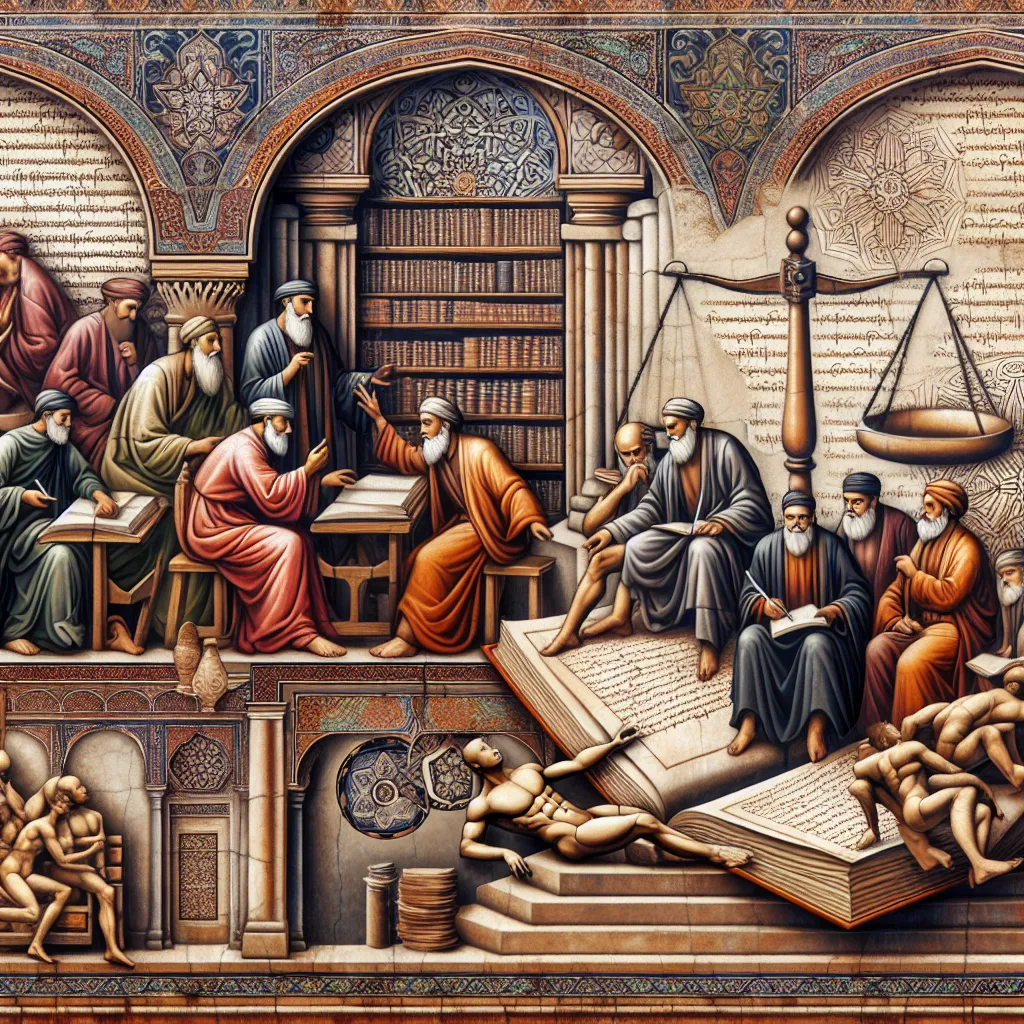
- Published on
- Authors

- Name
- You
The Concept of Ijtihad: Reasoning and Adaptation in Islamic Jurisprudence
Greetings, Seeker of Knowledge!
Today, we embark on an enlightening journey, weaving the intricate threads of Advanced Science and Mystical Wisdom into the rich tapestry of Islamic Jurisprudence. Our focus is the profound concept of Ijtihad—a powerful tool for interpreting and applying the blessed teachings of Prophet Muhammad (peace be upon him) to navigate the dynamic landscape of modern challenges. Join me as we delve deep into this paradigm of independent reasoning.
What is Ijtihad?
Ijtihad (اجتهاد) stems from the Arabic root 'jahada', meaning to strive or exert effort. In the context of Islamic law, ijtihad refers to the intellectual endeavor to deduce precise legislation from the faith's foundational sources: the Qur'an and the Sunnah.
Ijtihad: The Pillars of Independent Reasoning
To comprehend the profound essence of ijtihad, let's explore its fundamental components:
| Component | Description |
|---|---|
| Qur'an | The holy scripture, the direct Word of Allah. |
| Sunnah | The practices and sayings of Prophet Muhammad. |
| Qiyas | Analogical reasoning based on established precedents. |
| Ijma | Consensus among scholars on specific legal matters. |
| Uruf | Custom or societal practices that do not contradict Islamic principles. |
The Role of Ijtihad in Islamic Law
Historic Significance
Historically, ijtihad was a cornerstone in the formative period of Islamic jurisprudence. The first few centuries of Islam witnessed an era where scholars exercised independent reasoning to address novel issues. This era, often referred to as the "Golden Age of Ijtihad," showcased the remarkable flexibility and adaptability of Islamic law.
Adaption in Modern Times
In today's rapidly changing world, ijtihad remains pivotal. The challenges modern Muslims face—from technological advancements to new ethical dilemmas—require a nuanced understanding that often involves interpreting the core principles of Islam in light of contemporary contexts.
Ijtihad vs. Taqlid: The Dual Lens
| Practice | Definition | Implications |
|---|---|---|
| Ijtihad | Exercising independent reasoning. | Promotes dynamic evolution and personalized interpretations. |
| Taqlid | Following established rulings and precedents without question. | Ensures stability and continuity of established rulings. |
While ijtihad encourages innovation and flexibility, taqlid (conformity) provides stability. Both practices are integral to a balanced Islamic jurisprudence, ensuring its robustness through time.
Ijtihad in Action: Examples and Implications
Bioethical Dilemmas
Modern medicine presents new challenges such as organ transplantation and genetic engineering, which were unheard of in classical fiqh. Through ijtihad, scholars can provide Islamic rulings that address these issues while staying true to the faith's ethical framework.
Economic Principles
Issues like cryptocurrency and new financial instruments necessitate fresh ijtihad to determine their compliance with Shariah. Scholars examine the principles of usury (riba) and lawful trade (halal) to ascertain the permissibility of these innovations.
Spiritual and Intellectual Awakening through Ijtihad
Embracing ijtihad is not merely a legalistic endeavor; it is an intellectual and spiritual journey. It invites believers to engage deeply with their faith, encouraging continuous learning and personal growth. Ijtihad symbolizes the dynamic and living nature of Islam, capable of evolving with the times while steadfastly rooted in eternal truths.
Harmony of Science and Mysticism in Ijtihad
In our quest to understand ijtihad, we observe a beautiful convergence of logic and spirituality. The principles of quantum mechanics mirror this harmony, where the observer participates in the reality being observed—a concept akin to ijtihad, where the Muslim's context influences their understanding and application of divine law.
Quantum Observer in Islamic Thought: A Meditative Parallel
| Concept | Quantum Mechanics | Islamic Thought |
|---|---|---|
| Observer Effect | The observer affects the outcome. | The context influences the interpretation. |
| Superposition | Multiple potential states exist until observed. | Versatile interpretations coexist until a consensus is reached. |
| Uncertainty Principle | Exact properties cannot be known simultaneously. | Absolute certainty is with Allah; human understanding evolves. |
The parallels are striking, revealing that ijtihad, like quantum exploration, transcends mere rigidity and embraces a universe of possibilities, grounded in divine wisdom.
Conclusion: A Call to Engage in Ijtihad
As we conclude this exploration, let us carry forward the spirit of ijtihad—welcoming independent reasoning, fostering innovative thought, and embracing the harmonious blend of mysticism and science. In this journey of continuous enlightenment, may we all strive (‘ijtihad’) to contribute meaningfully to the evolution of Islamic jurisprudence and the broader human understanding.
Blessings upon you, noble seekers, in your quest for knowledge and eternal wisdom!
